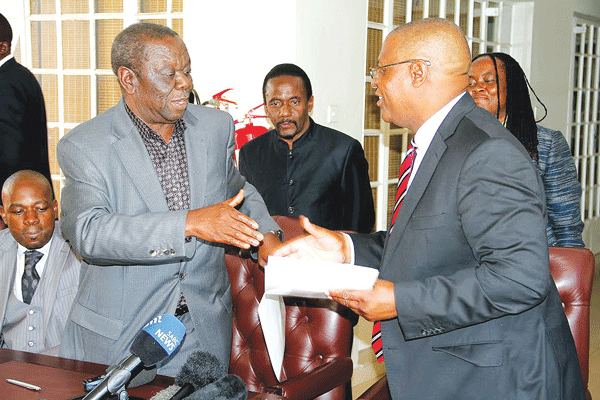
I don’t not think there is a country in Southern Africa which is as colourful and dramatic as Zimbabwe these days. Maybe South Africa, but theirs is single line story — one underlined by calls for President Jacob Zuma to leave office. And that too seems to be dying by the day, as Zuma has made it clear that only his party can tell him when to leave. That sounds very familiar and those who dare do so, are often the first to be forced to leave. Such is our politics.
Develop me: Tapiwa Gomo
In my beloved country, a week that started with goats dominating social media after they were proposed as a form of school fees payment, ended with the signing of agreements by opposition parties to form a united coalition against Zanu PF in the 2018 elections. A superficial logical conclusion would infer that there is desperation in government, hence, bringing goats into the school fees equation, while there is now common sense in the opposition as shown by the signing of coalition agreements.
While the goat fees proposal was mocked far and wide for lacking seriousness, the coalition project has won some plaudits among several analysts. The main question, however, is whether we are addressing the root causes of the problems. Even as the Education minister sought to clarify that he meant parents can sell their goats, under the facilitation of local authorities, and use the money to pay school fees, it is still not solving the problem of access to cash in the country. Barter trading is never going to solve the problem.
Back to the bigger picture. The talk of coalition has dominated our political discussions before the Movement for Democratic Change (MDC) was even formed. At birth, the MDC was a coalition of different groups, such as labour movement, farmers’ unions, the business community, academics, students and anything and anyone who was against the status quo at the time. While these would fall away with time, that coalition effectively managed to thwart a pro-government constitution in 2000 and put the proposed draft to rest.
After that defeat, the establishment drew some important lessons about how to stay in power under the rubber stamp of electoral democracy. Their days were numbered and yet their appetite for power was still growing, so they invested in systems that would enable them to tinker with voters’ ability to make free choices and tighten their grip on the system that runs the electoral process and produces the electoral results. That way, the legitimacy of the outcome would not be effectively challenged.
All charade elections that followed after the year 2000, were nothing but a characterisation of this investment. The formula was a simple “fear and tear” model. Instil fear among the electorate and for those who manage to vote otherwise, “tear” their ballots and impose the wishes of the establishment. And with time, this model has been perfected such that it no longer leaves blood, broken bones and traces of fraud. The 2013 election is a perfect example of how the system has become meticulous in its evolution. And 2018 will be better.
In all the elections held between 2002 and 2013, the opposition has never lacked enough support or votes to dislodge Zanu PF, but the process and systems through which elections are held are not designed to favour anyone other than the status quo. The reason I am raising this is that the coalition of political parties simply addresses the problem of numbers in situations where it is assumed that more political parties fragment the opposition electorate, which may advantage the status quo. Of course those who pursue this argument use Simba Makoni’s 8,3% vote in 2008 elections as an example.
- Chamisa under fire over US$120K donation
- Mavhunga puts DeMbare into Chibuku quarterfinals
- Pension funds bet on Cabora Bassa oilfields
- Councils defy govt fire tender directive
Keep Reading
I do like coalitions, as they keep things hygienic in a chaotic situation such as ours, where the system thrives on dividing, infiltrating and widening minor differences into rifts in opposition parties. However, coalitions alone will not address our problems and there is need for more pressure on electoral reforms prior to 2018 elections. As their model has demonstrated, the people’s vote is never defeated at the ballot box, but dies as soon as it enters the processes of the systems. The system decides, hence, the mantra that coalitions in Zimbabwe are nothing, but a bunch of zeros.
The system needs to be tackled starting now by strengthening national, regional and international advocacy and not wait for the futile post-election advocacy, which has not worked. Zanu PF is an old and troubled party, currently incapable of spreading its strength at different levels including nationally, at Sadc and international level. That is an opportunity the opposition needs to exploit. They currently lack consensus on most issues, which makes them weaker if they are overstretched prior to elections. Make no mistake, they will unite again in 2018, as it will be time to invest resources to protect power and defend their loot.
Local efforts alone will not yield meaningful results, as the system has internal mechanisms to legitimise electoral fraud, which denies external post-election intervention or negotiations. And for that reason, it is time to put Zimbabwe’s electoral reforms on the agenda at all levels so that the system feels the pressure starting from now. With the signing of the coalition agreements, perhaps it is time to strengthen the National Electoral Reform Agenda to spread its wings.
Tapiwa Gomo is a development consultant based in Pretoria, South Africa











